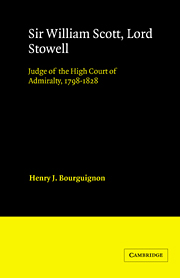Book contents
- Frontmatter
- Contents
- Preface
- List of abbreviations
- 1 Survey of English admiralty jurisdiction: how did it vanish?
- 2 Sir William Scott – a biographical sketch
- 3 The law of the instance court
- 4 Prize law: nationality – a study in detail
- 5 Prize law – a survey
- 6 Scott's judicial philosophy
- 7 Scott's influence
- Appendix: the Stowell notebooks
- Bibliography of primary sources
- Index
- CAMBRIDGE STUDIES IN ENGLISH LEGAL HISTORY
3 - The law of the instance court
Published online by Cambridge University Press: 29 October 2009
- Frontmatter
- Contents
- Preface
- List of abbreviations
- 1 Survey of English admiralty jurisdiction: how did it vanish?
- 2 Sir William Scott – a biographical sketch
- 3 The law of the instance court
- 4 Prize law: nationality – a study in detail
- 5 Prize law – a survey
- 6 Scott's judicial philosophy
- 7 Scott's influence
- Appendix: the Stowell notebooks
- Bibliography of primary sources
- Index
- CAMBRIDGE STUDIES IN ENGLISH LEGAL HISTORY
Summary
Sir William Scott, who late in life became Lord Stowell, is principally remembered for his numerous judgments as judge of the prize court in which he discussed and developed many facets of international law. As admiralty judge he also heard and determined a steady trickle of commercial maritime disputes brought by private parties who invoked the court's instance jurisdiction. Some of these instance judgments influenced the development of admiralty law. This chapter will analyze these instance decisions in light of the law the admiralty court applied fifty or seventy-five years earlier. The chief source for comparing Scott's judgments with eighteenth-century instance law is a draft abridgment of admiralty law, both instance and prize, which was prepared by Sir Edward Simpson, a civilian, about the middle of the eighteenth century. Scott had acquired this manuscript notebook, which is more fully described in the Appendix. In three cases he explicitly relied on it when giving his decision.
The admiralty court in the eighteenth and early nineteenth centuries, despite the earlier prohibitions of the common law courts, continued to hear some of the disputes which arose from the maritime commerce of the nation. But without the enormous business generated by the capture of vessels in time of war, the prize cases, the admiralty court remained largely an idle, backwater court. Since they received no fixed salaries, the court's officials had to survive on a lean harvest of fees whenever the misfortune of peace occurred. Prior to the French wars the principal registrar received only £111 for the year 1792 from the fees of his offices as registrar of the courts of admiralty, prize appeals and delegates.
- Type
- Chapter
- Information
- Sir William Scott, Lord StowellJudge of the High Court of Admiralty, 1798–1828, pp. 59 - 114Publisher: Cambridge University PressPrint publication year: 1987



